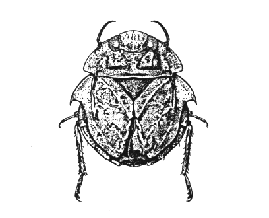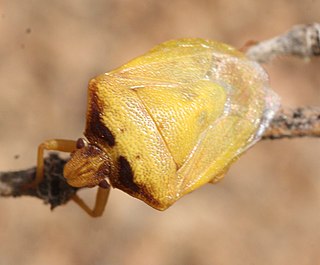
Ranatra is a genus of slender predatory insects of the family Nepidae, known as water scorpions or water stick-insects. There are around 100 Ranatra species found in freshwater habitats around the world, both in warm and temperate regions, with the highest diversity in South America and Asia. Fewer are found elsewhere, but include several African, some in North America, three from Australia and three from the Palearctic, notably the relatively well-known European R. linearis. Since Ranatra belongs to the family Nepidae which in turn belongs to the order Hemiptera, ranatrids are considered "true bugs".

Cosmopepla is a genus of stink bugs in the family Pentatomidae. Cosmopepla lintneriana is the type species. Cosmopepla lintneriana was first described in 1798 by Johan Christian Fabricius as Cimex carnifex.

Alydus is the type genus of broad-headed bugs in the family Alydidae. There are about 11 described species in Alydus, including 2 extinct species. Species are recorded from North America and Europe through to temperate Asia.

Limnocoris is a genus of creeping water bugs in the family Naucoridae. There are more than 70 described species in Limnocoris.

Pelocoris femoratus is a species of creeping water bug in the family Naucoridae. It is found in Central America, North America, and South America. They prefer still water with a high density of vegetation and eggs are laid on submerged plants. They feed on other arthropods and actively catch them while swimming. They are active from spring to autumn and can give a painful bite if not handled properly.

Pelocoris is a genus of creeping water bugs in the family Naucoridae. There are about 15 described species in Pelocoris.

Dendrocoris is a genus of stink bugs in the family Pentatomidae. There are about 11 described species in Dendrocoris.

Geocoris pallens, the western big-eyed bug, is a species of big-eyed bug in the family Geocoridae. It is found in Central America, North America, and Oceania.

Geocoridae is a family of big-eyed bugs in the order Hemiptera. There are more than 290 described species in Geocoridae.
Trichomagdalis is a genus of wedge-shaped bark weevils in the beetle family Curculionidae. There are about six described species in Trichomagdalis.

Stygnocoris is a genus of dirt-colored seed bugs in the family Rhyparochromidae. There are about 15 described species in Stygnocoris.
Geocoris howardi is a species of big-eyed bug in the family Geocoridae. It is found in North America.

Ambrysus is a genus of creeping water bugs in the family Naucoridae. There are more than 90 described species in Ambrysus.

Mozena is a genus of leaf-footed bugs in the family Coreidae. There are more than 30 described species in Mozena.
Ambrysus mormon, the creeping water bug, is a species of creeping water bug in the family Naucoridae. It is found in the western United States and northwestern Mexico.
Euschistus conspersus, the consperse stink bug, is a species of stink bug in the family Pentatomidae. It is found in North America.
Catapastus conspersus is a species of flower weevil in the beetle family Curculionidae. It is found in North America.

Alydus eurinus is a species of broad-headed bug in the family Alydidae. It is found in North America.

Emblethis is a genus of dirt-colored seed bugs in the family Rhyparochromidae. There are more than 30 described species in Emblethis.
Geocoris bullatus, the large big-eyed bug, is a species of big-eyed bug in the family Geocoridae. It is found in North America.










